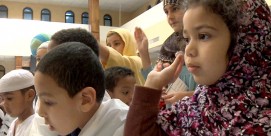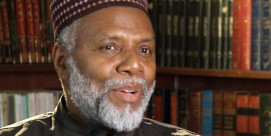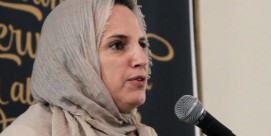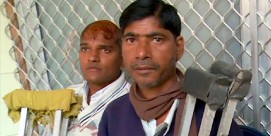In This Episode << SLIDE LEFT TO SEE ADDITIONAL SEGMENTS
Muslims and Charity Interview Salam al-Marayati
Read more of Kim Lawton’s interview about Muslim charities with Salam al-Marayati, executive director of the Muslim Public Affairs Counsel:
Q: How much concern is there in the Muslim community about the situation for Muslim charities today?
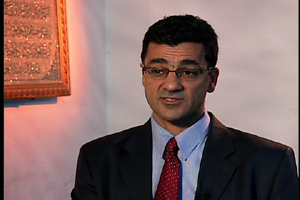 A: I think there are a lot of concerns, mainly because people feel like they’re working in the dark, that the government really hasn’t provided avenues to give donations, especially when it comes to relief work overseas, in a safe way, in a way that people feel like they’re not going to be harassed by the government. The government has said that they are going to make sure that money doesn’t go to the hands of terrorists, which I think is very good. It’s a laudable effort on their part. But, at the same time, we cannot sacrifice the ability to give to those in need, especially in places like the Palestinian territories, Kashmir, and Chechnya that are the hot spots, that need the relief the most in terms of the Muslim world. And what we have done is told the government we need to do something in partnership with you to make sure that, while there is no terrorism financing, haritable giving for the needy is not sacrificed as a result.
A: I think there are a lot of concerns, mainly because people feel like they’re working in the dark, that the government really hasn’t provided avenues to give donations, especially when it comes to relief work overseas, in a safe way, in a way that people feel like they’re not going to be harassed by the government. The government has said that they are going to make sure that money doesn’t go to the hands of terrorists, which I think is very good. It’s a laudable effort on their part. But, at the same time, we cannot sacrifice the ability to give to those in need, especially in places like the Palestinian territories, Kashmir, and Chechnya that are the hot spots, that need the relief the most in terms of the Muslim world. And what we have done is told the government we need to do something in partnership with you to make sure that, while there is no terrorism financing, haritable giving for the needy is not sacrificed as a result.
Q: Is there fear within the community and among individual donors that they might come under suspicion?
A: I think a lot of people have fear about giving, and I think it’s justifiable. I was at a hearing in the Congress one time when a senator says, “We’re not just going to go after the charities, we might also go after donors.” And so now if it’s an issue of donor rights, then I think we should be very concerned, and also from an American geopolitical standpoint I think the United States government has to think about, and think carefully about what it’s doing, because it does not want to cut itself off from the people of the Muslim world, because we’re trying to win hearts and minds. And if the people of the Muslim world see that the U.S. government is against the relief efforts that are supposed to help the people in that region, then the whole campaign to win hearts and minds will be sacrificed as well.
Q: Is there a perception that the U.S. government is unfairly going after, or perhaps taking a look at, some of these groups?
A: Definitely the perception is that Muslim charities are going through more scrutiny, and I think that’s understandable. Nobody is saying we shouldn’t, and that’s just a reality of the post-9/11 era. The question is can we allow a safe harbor for Muslim charities to operate under without the fear of getting harassed, targeted, and shut down by the U.S. government? I’ll just give you an example. We formed a national council of Muslim nonprofits, with Treasury in the discussion, with a number of Muslim charities at the table, and with a number of other Muslim organizations working with us on that issue. And after two or three years, one charity after another got shut down, and we had no more organizations to form the nonprofit association. So that project unfortunately died as a result of these groups being shut down without any explanation, without giving us proper information or recourse on what to do if we want to form a coalition that works with the Treasury Department on trying to provide relief for those in need overseas.
Q: What reverberations or shock waves did that send when some of these organizations just all of a sudden–
A: I wouldn’t say that there were reverberations or shock waves. It’s like we’ve just gotten used to it. We know that this is the reality of the post-9/11 era, and we’re trying to adjust. We’re just trying to continue working, meet our religious obligation, because the Qur’an, the whole theme of the Qur’an is social justice. Without social justice, religion becomes just a means of exploitation, and that’s what the extremists are doing. They are promoting religion without justice, which is mainly exploitation. And so now to have our government tell us that charitable giving is going to be more narrow, or could be even cut off, that is taking away from people’s feeling that they are just performing their religious obligation. So that’s one problem. Then the second problem is, well, how are we going to work with the government? We want to develop a partnership between the Muslim community and the U.S. government. Treat us as partners, not as suspects. And we feel that we can work together on meeting the U.S. government goals and, at the same time, allowing Muslim Americans to perform their religious obligations, and to give to those in need. Whether they want to give here in America or give abroad, it’s their right to do so, and to protect the donor, because now you have another situation where about $12 or 15 million were frozen when the United States government shut those charities. That money now has disappeared for legal costs, for administrative costs, so it didn’t go to the needy. And there is a group of nonprofits now that are calling for the Treasury Department to return money to the donors, or to send the money to the intended recipients through a third party, through another charity that is already operating in the region. So we’re willing to adjust, but we feel that the Treasury Department and the U.S. government in general have not adjusted as well. They’re still trying to figure out what to do.
Q: Do you sense that the Treasury Department or the U.S. government isn’t willing to enter into the partnerships you’re proposing?
A: I think there is an intention to work in partnership with us, and there’s a desire to have dialogue at a certain level, at the low level, if you will, of staffers in our government. The policy people are the ones that are not in dialogue, so when it comes to Treasury, it should be the Secretary of the Treasury. It should be Stuart Levy, who is in charge of the whole operation, that should be in dialogue with us. With the F.B.I. we have dialogue with the director, with his assistant directors. With the Justice Department we’ve met with [former] Attorney General Gonzales on a number of occasions. We’ve even met with the president on three occasions. But the Treasury Department still has not sat down with us, other than one time, to say “Yes, we’re willing to have a dialogue with you,” and then provided some very broad guidelines to us, and then that was it. We really haven’t had much movement in terms of working out a healthy partnership with the Treasury on this issue.
Q: Talk about the importance of giving and charity within Islam, the principle of zakat. How important is it?
A: Islam is a religion that was established for the purpose of promoting one of the highest ethical values of all faiths, and that is justice. Part of promoting justice is to work for those who are dispossessed, who are disenfranchised, who are needy, who are impoverished. It even lists, in the Qur’an, all these categories of people who deserve what God has given us. In other words, it’s not, you know–what I have in this life is not mine; it’s something that God has granted me, you know, in luxury–the luxury of time, the luxury of money, the luxury of being able to move freely. Other people don’t have that luxury; they don’t have that right. And so it is my responsibility as a Muslim to make sure that that person has the right. And so I work for the homeless, as a Muslim, and their rights. And I work for the refugees overseas, who are the homeless of the world, as my responsibility. So whatever the government says, you know, is secondary to what my religion is telling me, and that is I have to help those in need. Of course, none of that money should go into the hands of terrorism. And every Muslim individual that works in this field that I’ve met, every humanitarian aid worker wants to make sure that money goes into the right hands, not into the wrong hands. And to date there hasn’t been a single conviction of any Muslim individual for terrorism financing. So all this talk about mosques now are fronts for terrorists and terrorists financing, and charities are just giving money to terrorists abroad–that is for public consumption. That is a myth. That’s not the reality. The reality is people are working because the Qur’an says you have to give money to the needy, you have to give the money to the refugee, you have to give the money to the orphan, you have to give money to the homeless. So we’re just performing our religious obligation, and I know that there are Christian missionaries and other Christian organizations that do exactly the same thing, because they feel it is their lifelong mission. And there are Jewish organizations that do the same thing. When it comes to Muslim organizations in America it’s interesting, because really we’re talking about a handful of organizations, and probably the smallest of all the other religious groups that do this kind of work. So when it comes to regulating that from the U.S. government standpoint, it should be relatively easy and simple. But I think our government has made it much more difficult than it should be in terms of regulating. In fact, they’ve deregulated the whole process. Now you hear stories about people, instead of giving money to a charity they’ll just send cash overseas. And you don’t know where the cash is ending up, whose hands it’s in right now. So in a way I think the U.S. government’s objectives of controlling financing of charities and preventing terrorism financing could be backfiring. And we just don’t know, because now the whole issue is deregulated.
Q: People are doing it more underground–
A: They find ways, exactly. I mean, people find ways to send money overseas. And if the government is saying don’t give money to these organizations, then they’re not going to give money to any organizations. They’ll give money through other channels. I think people have to understand that Muslim Americans also give to a number of domestic programs. They give to libraries. They give to homeless shelters. There’s, here in Los Angeles, something called the Free Umma Clinic, and these are Muslim doctors that provide free services, medical services, to the indigent here in South Central Los Angeles. And there are fundraisers for those programs as well, so people give both domestically and internationally. But when it comes to the Muslim world, it seems that that area is off limits, or that’s the message we’re getting from the U.S. government. And I think that’s not the message they want; they should think about delivering a different message to the world, because this becomes a source of anti-American sentiment when people view that the United States is blocking aid to a certain region where people are really in need. But Muslim Americans are involved in these clinics that I just mentioned. They’re involved in helping out schools. One of the largest donors for other charities involving the United Way, for example, involving YMCAs, involving so many other groups happen to be Muslim, and also donors to major academic institutions. So people give and, again, I think that is based on the Qur’anic injunction that I have to give part of what I’ve been granted in this life to the needy. Zakat means, in Arabic, “the purifying dues.” So by giving I purify myself in the process, and it’s all part of the self-purification process.
Q: Some people say don’t give your money to a Muslim organization, just give it to the Salvation Army or somebody else that’s not getting looked at. Is that the right way to respond?
A: I don’t think so. I think that creates sort of a negative self-image of the Muslim community. I think you should give to non-Muslims, definitely, but you should also be proud of your own heritage, of your own religion, and not feel that you’re being forced out of your own identity. I think it creates an identity crisis when you feel like you have to give to non-Muslim organizations to be safe. It should be free will in terms of giving to any organization, but to feel that you’re forced out of giving to Muslim organizations is very unhealthy.


